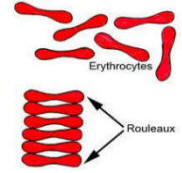If we started depending upon laboratory tests then most of the autoimmune diseases would go undetected.
It is by history alone, then physical findings that a autoimmune disorder needs to be diagnosed.
The best tests are SED RATE, CRP, ASO TITER.
Sed rate is the cheapest test and the oldest and simplest one to measure inflammation.
Utility of the ESR: Key Considerations

- The ESR is an inexpensive, simple test of chronic inflammatory activity.
- Indications for the ESR have decreased as the sophistication of laboratory testing has increased.
- The ESR rises with age, but this increase may simply reflect a higher disease prevalence in the elderly.
- The use of the ESR as a
screening test in asymptomatic persons is limited by its low
sensitivity and
specificity. - An elevated ESR is a key diagnostic criterion for polymyalgia rheumatica and temporal arteritis, but normal values do not preclude these conditions.
- When there is a moderate suspicion of disease, the ESR may have some value as a "sickness index."
- An extremely elevated ESR (>100 mm/hr) will usually have an apparent cause--most commonly infection, malignancy or temporal arteritis.
- A mild to moderately elevated ESR without obvious etiology should prompt repeat testing after several months rather than an expensive search for occult disease.
Screening for Systemic Disease or Neoplasia
Unfortunately, the ESR is neither sensitive nor specific when used as a general screening test. For instance, the ESR may be elevated in the presence of infectious disease, other inflammatory or destructive processes, collagen vascular disease or malignancy,1-3 but it may not be increased in a number of infectious diseases (e.g., typhoid fever, malaria, mononucleosis), allergic processes, angina (as opposed to myocardial infarction) or peptic ulcer disease (as opposed to active inflammatory bowel disease).
Because an elevated ESR may occur in so many different clinical settings, this finding is meaningless as an isolated laboratory value. In addition, some patients who have malignant tumors, infections or other inflammatory disorders will have normal ESR values. Most unexplained ESR elevations are short-lived and not associated with any specific underlying process. In those instances where disease is present, it will usually be obvious after completion of history taking, physical examination and collection of routine laboratory data.
What Is CRP?
It is not a new test, but it is a test in the news. CRP, also known as C-Reactive Protein, is a test which measures the concentration in blood serum of a special type of protein produced in the liver that is present during episodes of acute inflammation or infection.
The modern guidelines are women should not get
Screening mammograms before age 50 should not be done routinely and should be based on a woman's values regarding the risks and benefits of mammography.
Above from U.S. Preventive Services Task Force (USPSTF)
65